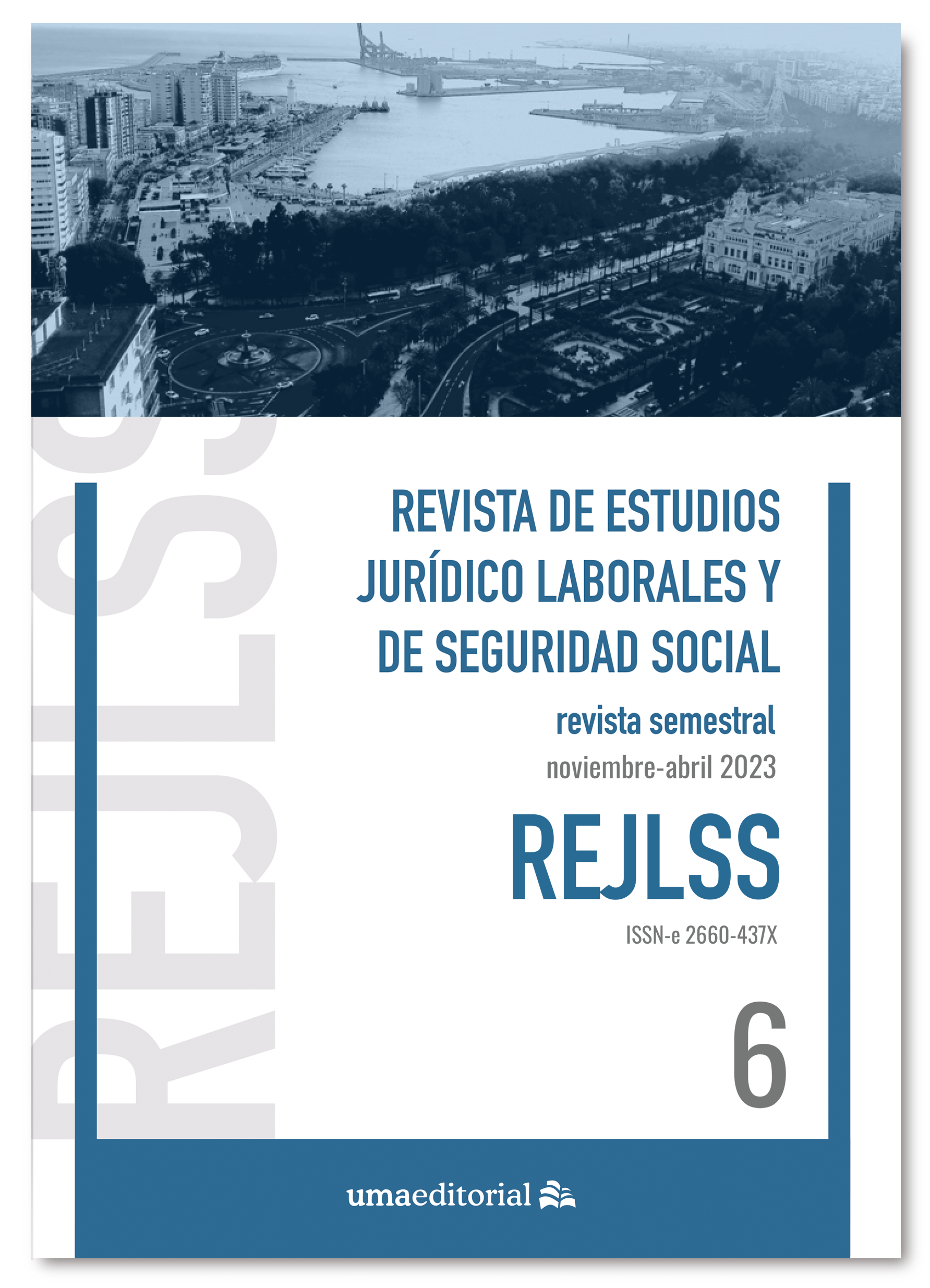The the new dimension of labour intermediation
DOI:
https://doi.org/10.24310/rejlss.vi6.16068Keywords:
employment, labour intermediation, placement, outplacement, selectionAbstract
The imminent approval of the Employment Act will produce an important change in the policies for entering the labour market. One if the issues on which the modifications will have more relevance is in relation with the concept of labour intermediation. Traditionally it has been restricted to connecting job offers and demands, but a few years ago the outplacement activity of workers who have been subject to collective dismissals has been included in its scope. Now the new Act also frames the selection activity within intermediation, which had traditionally been left out for reasons that have lost importance many years ago. Regarding the outplacement activity, the reform is not very innovative, but it opens the possibility of it being carried out in non-extinction situations, such as in the case of lay-off and short-time, especially the so-called “ERTE RED”. Other ancillary activities are also integrated, particularly certain support services that allow those who are job seekers to adequately follow the selection, placement and outplacement initiatives in which they are involved. About all this bundle of reforms a critical assessing comment is poured, which, despite some objections, is positive in general terms.
Downloads
Metrics
Publication Facts
Reviewer profiles N/A
Author statements
Indexed in
-
—
- Academic society
- N/A
- Publisher
- Universidad de Málaga. UMA Editorial
References
Cabeza Pereiro, J., “La metamorfosis de los mecanismos de suspensión del contrato y reducción de jornada en la reforma laboral de 2021”, Revista Galega de Dereito Social, núm. 14, 2022.
Cabeza Pereiro, J., “Sobre los porqués del auge de las agencias privadas de empleo”, en AA.VV. (Sierra Benítez, E.M. y Mella Méndez, L., Coords.), Los actuales cambios sociales y laborales: nuevos retos para el mundo del trabajo. III, Cambios en la intermediación laboral y nuevos retos para el emprendimiento y el empleo decente, Peter Lang, 2017.
Cardona Rubert, Mº.B., “Las agencias de colocación en el Real Decreto-ley 10/2010, de 16 de junio, de medidas urgentes para la reforma del mercado de trabajo”, en AA.VV. (García-Perrote
Escartín, I. y Mercader Uguina, J.R., Dirs.), La reforma laboral 2010, Lex Nova, Valladolid, 2010.
García Murcia, J., “Las nuevas normas sobre colocación y cesión de trabajadores. Una primera aproximación a la Ley 10/1994 y normas concordantes”, Temas Laborales, núm. 31, 1994.
Navarro Nieto, F., “Medidas sociales de acompañamiento y mantenimiento del empleo”, en AA. VV., Reestructuraciones Empresariales. XXXI Congreso Anual de la Asociación Española de
Derecho del Trabajo y de la Seguridad Social, MTES, Madrid, 2021.
Valdés Dal-Ré, F., “Proceso de colocación y formación del contrato de trabajo”, Revista de Política Social, núm. 117, 1978.
Downloads
Published
How to Cite
Issue
Section
License
In the Revista de Estudios Juridico Laborales y de Seguridad Social (REJLSS) we are clearly committed to a policy of open access to scientific knowledge (See Berlin Declaration).
Those authors who have publications with this journal accept the following terms:
This journal provides immediate free access to its content under the principle of making research freely available to the public. All the contents published in the REJLSS are subject to the Creative Commons license
Attribution-NonCommercial-NoDerivatives 4.0 International (CC BY-NC-ND 4.0)
Copyrights are of two kinds: moral and patrimonial. Moral rights are perpetual, inalienable, non-transferable, inalienable, unattachable and imprescriptible prerogatives. In accordance with Spanish copyright legislation, the authors who publish in REJLSS retain the moral right over their work, as well as the ownership of the patrimonial right, which will be transferred to the University of Malaga for its dissemination in open access.
The patrimonial rights, refer to the benefits that are obtained by the use or disclosure of the works. REJLSS is published in open access and is exclusively authorized to perform or authorize by any means the use, distribution, dissemination, reproduction, adaptation, translation or transformation of the work.
It is the responsibility of the authors to obtain the necessary permissions of the images that are subject to copyright.
Authors whose contributions are accepted for publication in this journal retain the non-exclusive right to use their contributions for academic, research and educational purposes, including self-archiving or depositing in open access repositories of any kind.
The electronic edition of this magazine is edited by the Editorial of the University of Malaga (UmaEditorial), being necessary to cite the origin in any partial or total reproduction.
The authors may adopt other non-exclusive license agreements for the distribution of the version of the published work (eg: deposit it in an institutional telematic archive or publish it in a monographic volume) provided that the initial publication is indicated in this magazine.
Authors are allowed and recommended to disseminate their work through the Internet (eg, in institutional telematic archives or on their website) before and during the submission process, which can produce interesting exchanges and increase citations of the published work.







19.png)
